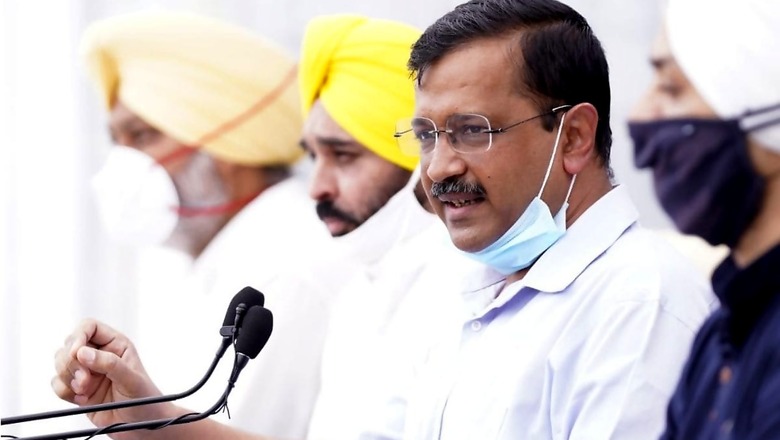Arvind Kejriwal Dishes Out Delhi Recipe in Punjab, Promises 300 Units of Free 24x7 Power if AAP Wins

views
While addressing a press conference in Chandigarh, AAP National Convenor and star campaigner for the party, Arvind Kejriwal made three promises — to provide 300 units of electricity free to every household in Punjab, waive off pending electricity bill of every domestic consumer and provide uninterrupted electricity supply 24 hours a day.
Staying with the style of the AAP’s Delhi’ campaign in 2020, and an obvious dig at Punjab Chief Minister Amarinder Singh, Delhi Chief Minister Arvind Kejriwal said that these were ‘guarantees’ and not ‘promises by Captain’. Kejriwal pointed out that 73% of people who consume up to 200 units of electricity get a ‘zero’ bill and in Punjab also up to 80% of people will start getting zero bills.
Kejriwal said that he hoped that these announcements would make the people of Punjab, especially women very happy. Pointing out that electricity tariffs were among the highest in the country despite Punjab producing more electricity than it needs, Kejriwal argued that the high rates could be explained by a ‘dirty nexus’ between the electricity companies and the political governing class of Punjab. The Delhi CM did not make any distinction between the Akalis and the Congress when he alleged a nexus between the ruling parties of Punjab and electricity companies.
Kejriwal said that if this ‘dirty nexus’ is broken, Punjab could also have among the cheapest electricity rates in the country as Delhi.
The AAP, with twenty members, is the principal opposition in the Punjab Assembly. Kejriwal, in Chandigarh, also underlined the fact that over the past one and half years, the party under the leadership of Bhagwant Mann has been agitating on the streets for electricity rates to be slashed but to no effect. Kejriwal said that high electricity rates have led to anguish in every nook and corner of Punjab — in villages, in Amritsar where camps were set up, in Jallandhar, Bhatinda, Ludhiana, Pathankot and in every village.
“Women are the ones who are most unhappy. Why? A man does a job, runs a shop or a business, earns the whole month and then hand over the money to his wife. For the whole month, the woman has to run the household, our mothers and sisters have to run the household. Many women have told us that more than half our earnings actually is spent on electricity bills. So there isn’t enough for either food or children’s education,” Kejriwal argued that high electricity bills had caused maximum difficulty to women.
“When we fought elections for the first time in Delhi in 2012, the situation in Delhi was the same, people were getting irrationally high electricity bills of up to Rs 50,000 or Rs 1,00,000. At that time, there was a nexus between the then government and the electricity companies,” he said.
Kejriwal said that he was happy that after six to seven years of the AAP government, Delhi has 24 hours electricity supply and the cheapest tariffs. Pitching his party to the voter, Kejriwal said that the same has to be done in Punjab also.
“In Punjab, the AAP government will give up to 300 units of electricity free to every household and as per our calculations 77% to 80% of the people in Punjab will have zero power bills,” said Kejriwal, making the first of the three announcements today. “There will be twenty-four hours electricity supply but no bills,” Kejriwal underlined. Making the second promise, Kejriwal said that in village after village, people have resorted to accessing electricity (sab log Kandi Mar ke rather hain) by connecting wires to electricity poles and were living in fear and as soon as an official entered the village, they would withdraw the wires. The connections had been cut off due to their inability to either pay the irrationally high bills, or bribe the officials on the ground to rationalise the same.
“People are living in fear and are not accorded respect, to give them a life of dignity, we will waive off all pending bills of domestic consumers,” was Kejriwal’s second big poll promise of the day. The third poll promise was uninterrupted electricity supply for every house and no more power cuts in Punjab.
“What I just said is Kejriwal’s guarantee, not promises of Captain,” the Delhi CM said in a clear dig at Captain Amarinder Singh.
Arvind Kejriwal said that the moment the AAP forms the government, with the first pen, up to 300 units of electricity would be made free in Punjab and pending arrears would be waived off. However, it would take three to four years to deliver on the third promise of uninterrupted power supply as that involved the overhaul and reforming the entire infrastructure, he said.
A day ahead of his second visit to the election-bound Punjab within ten days, Kejriwal had tweeted in Punjabi, ‘It is very difficult for a woman to run the household in times of such price rise. In Delhi, we provide 200 units of free electricity to every household. Women are very happy with this. Women in Punjab also are extremely unhappy due to high prices. In Punjab also, the AAP government will provide free electricity.’
Kejriwal’s tweet was aimed at winning over the women voters in Punjab. Free electricity up to 200 units, free water up to 20,000 litres, free WiFi, free bus rides for women are an integral part of the ‘Kejriwal Model of Development’, as the AAP terms it and will be the AAP’s calling card in Punjab.
The AAP’s pitch to the voters in Punjab would be that the party if voted to power will deliver what the Congress promised but failed to do. AAP’s Punjab in-charge Raghav Chadha said that in Delhi, AAP government provides free electricity even if does not produce electricity while Punjab produces free electricity yet Captain Amarinder Singh is looting people.
In the 2014 Lok Sabha elections, in Punjab, more women than men turned out to vote. While the figure for men was 70.7%, for women it was 71.1%. In 2017 Punjab Assembly elections, while 78.14% of women cast their votes, for men, the figure was 76.69%. In terms of numbers, women voters far outnumbered men. However, in the 2019 Parliamentary elections, Punjab’s overall voting percentage actually dipped from 70.89% in 2014 to 65.84%. This happened even as the country recorded its highest-ever voter turnout at 67.11%.
In Punjab, of the 1,37,77,295 people who turned out to vote, 64,51,544 were women, i.e 46.82%. It is also important to note that just 65.61% of the women electors actually turned out to vote. It is this gap that the AAP aims to bridge by attracting woman voters considering that it has worked for the party in Delhi.
The AAP’s specific appeal is towards this constituency of women voters. Women are more likely than men to turn out and vote if they feel that the outcome of the polls could have a positive impact on issues that confront them. The AAP has to cover a lot of ground since its debut 2014 elections when it surprised everyone winning 4 out of the 13 Lok Sabha seats. However, just three years later, it won just 20 out of the 117 Assembly seats even in the face of visible goodwill and in 2019, it won just one out of the 13 Lok Sabha seats.
Read all the Latest News, Breaking News and Coronavirus News here.















Comments
0 comment